MGBBT1TEN Essay: Sustainable Tourism and Industry in the UK
VerifiedAdded on 2023/06/07
|8
|2644
|231
Essay
AI Summary
This essay provides a comprehensive overview of sustainable tourism development in the UK. It begins by defining sustainable tourism and outlining its core principles, emphasizing the balance between environmental, social, and economic considerations. The essay then identifies key stakeholders in the decision-making process, including tourists, businesses catering to tourists, government bodies, and local residents, highlighting their respective roles and influences. Furthermore, it analyzes the macro-environmental factors (political, economic, social, technological, legal, and environmental) that contribute to sustainable tourism in the UK. The essay also delves into the micro-environment, examining consumer behavior, competitors, suppliers, and promotional activities that influence the demand for tourism products. Finally, it explores the motivating factors driving tourist behavior, such as the increasing awareness of mental health and the influence of travel trends. The conclusion summarizes the key aspects of sustainable tourism and its development in the UK, emphasizing the multifaceted nature of the industry and the importance of balancing various factors for long-term sustainability.
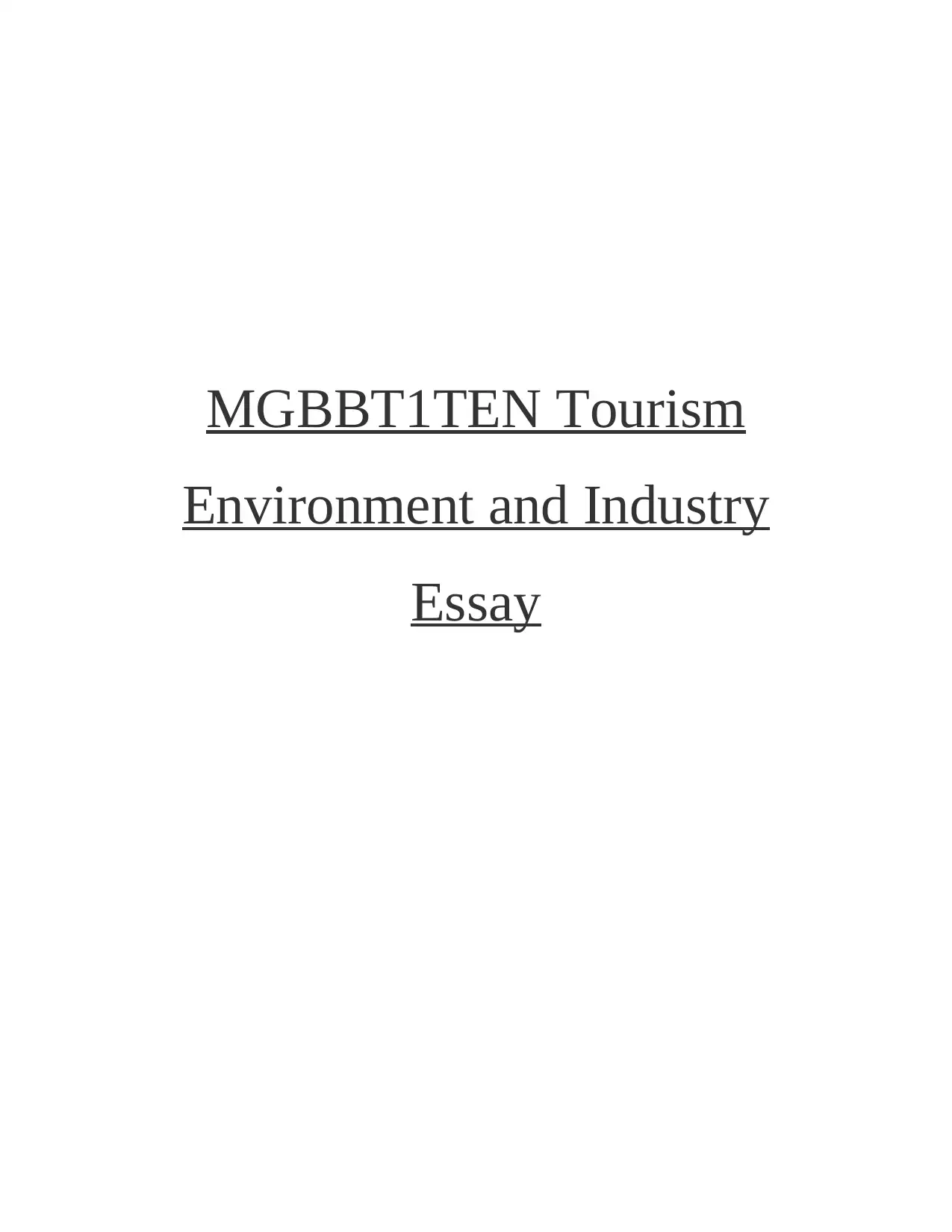
MGBBT1TEN Tourism
Environment and Industry
Essay
Environment and Industry
Essay
Paraphrase This Document
Need a fresh take? Get an instant paraphrase of this document with our AI Paraphraser
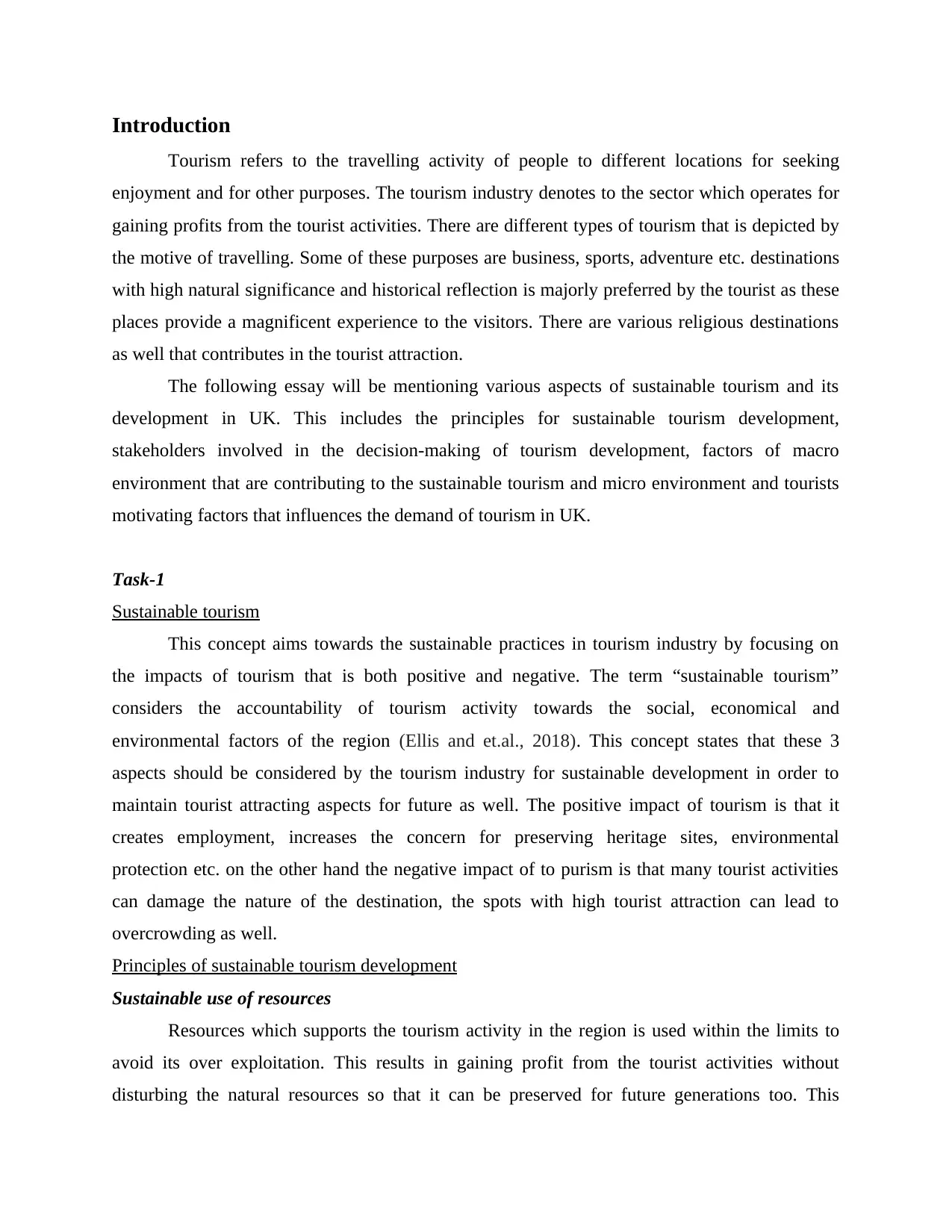
Introduction
Tourism refers to the travelling activity of people to different locations for seeking
enjoyment and for other purposes. The tourism industry denotes to the sector which operates for
gaining profits from the tourist activities. There are different types of tourism that is depicted by
the motive of travelling. Some of these purposes are business, sports, adventure etc. destinations
with high natural significance and historical reflection is majorly preferred by the tourist as these
places provide a magnificent experience to the visitors. There are various religious destinations
as well that contributes in the tourist attraction.
The following essay will be mentioning various aspects of sustainable tourism and its
development in UK. This includes the principles for sustainable tourism development,
stakeholders involved in the decision-making of tourism development, factors of macro
environment that are contributing to the sustainable tourism and micro environment and tourists
motivating factors that influences the demand of tourism in UK.
Task-1
Sustainable tourism
This concept aims towards the sustainable practices in tourism industry by focusing on
the impacts of tourism that is both positive and negative. The term “sustainable tourism”
considers the accountability of tourism activity towards the social, economical and
environmental factors of the region (Ellis and et.al., 2018). This concept states that these 3
aspects should be considered by the tourism industry for sustainable development in order to
maintain tourist attracting aspects for future as well. The positive impact of tourism is that it
creates employment, increases the concern for preserving heritage sites, environmental
protection etc. on the other hand the negative impact of to purism is that many tourist activities
can damage the nature of the destination, the spots with high tourist attraction can lead to
overcrowding as well.
Principles of sustainable tourism development
Sustainable use of resources
Resources which supports the tourism activity in the region is used within the limits to
avoid its over exploitation. This results in gaining profit from the tourist activities without
disturbing the natural resources so that it can be preserved for future generations too. This
Tourism refers to the travelling activity of people to different locations for seeking
enjoyment and for other purposes. The tourism industry denotes to the sector which operates for
gaining profits from the tourist activities. There are different types of tourism that is depicted by
the motive of travelling. Some of these purposes are business, sports, adventure etc. destinations
with high natural significance and historical reflection is majorly preferred by the tourist as these
places provide a magnificent experience to the visitors. There are various religious destinations
as well that contributes in the tourist attraction.
The following essay will be mentioning various aspects of sustainable tourism and its
development in UK. This includes the principles for sustainable tourism development,
stakeholders involved in the decision-making of tourism development, factors of macro
environment that are contributing to the sustainable tourism and micro environment and tourists
motivating factors that influences the demand of tourism in UK.
Task-1
Sustainable tourism
This concept aims towards the sustainable practices in tourism industry by focusing on
the impacts of tourism that is both positive and negative. The term “sustainable tourism”
considers the accountability of tourism activity towards the social, economical and
environmental factors of the region (Ellis and et.al., 2018). This concept states that these 3
aspects should be considered by the tourism industry for sustainable development in order to
maintain tourist attracting aspects for future as well. The positive impact of tourism is that it
creates employment, increases the concern for preserving heritage sites, environmental
protection etc. on the other hand the negative impact of to purism is that many tourist activities
can damage the nature of the destination, the spots with high tourist attraction can lead to
overcrowding as well.
Principles of sustainable tourism development
Sustainable use of resources
Resources which supports the tourism activity in the region is used within the limits to
avoid its over exploitation. This results in gaining profit from the tourist activities without
disturbing the natural resources so that it can be preserved for future generations too. This
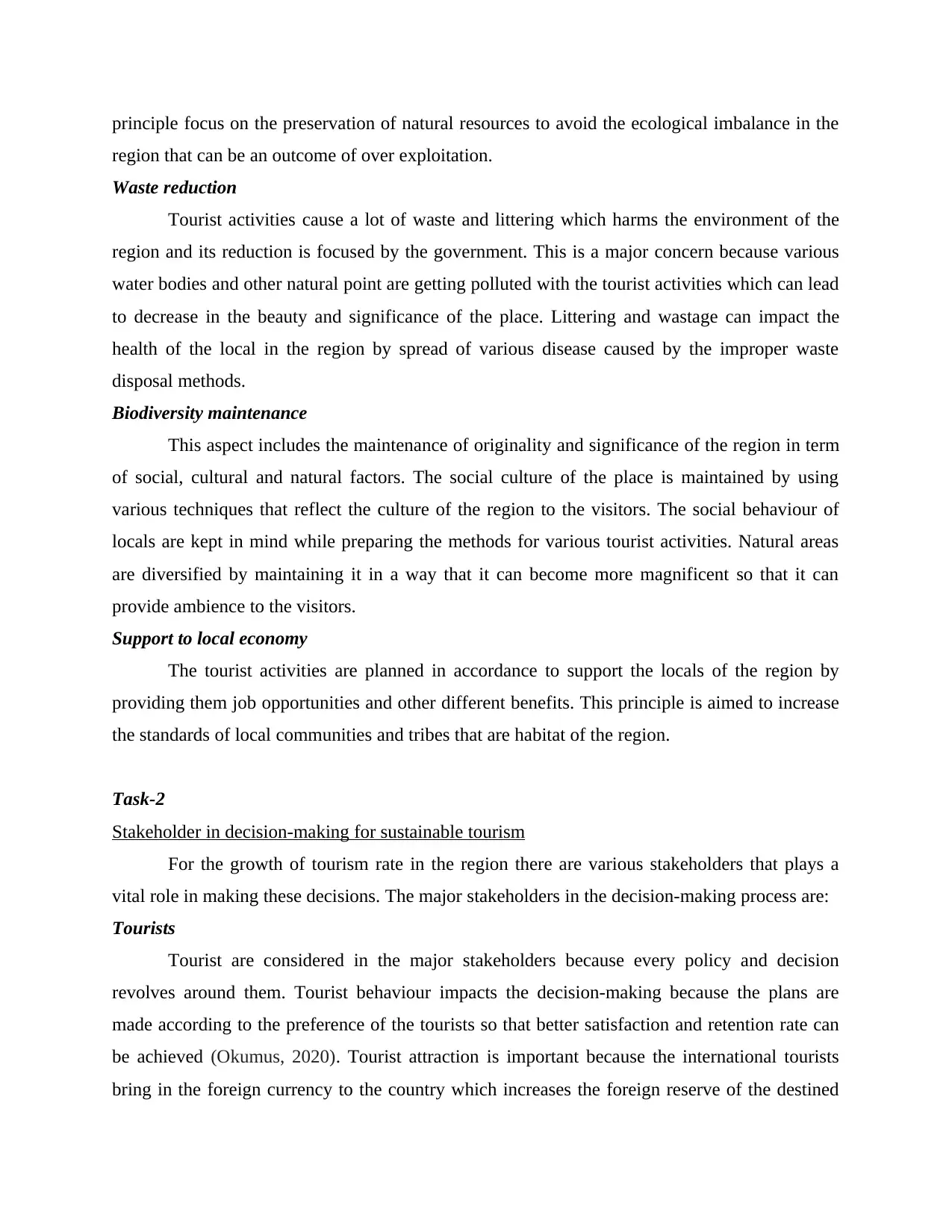
principle focus on the preservation of natural resources to avoid the ecological imbalance in the
region that can be an outcome of over exploitation.
Waste reduction
Tourist activities cause a lot of waste and littering which harms the environment of the
region and its reduction is focused by the government. This is a major concern because various
water bodies and other natural point are getting polluted with the tourist activities which can lead
to decrease in the beauty and significance of the place. Littering and wastage can impact the
health of the local in the region by spread of various disease caused by the improper waste
disposal methods.
Biodiversity maintenance
This aspect includes the maintenance of originality and significance of the region in term
of social, cultural and natural factors. The social culture of the place is maintained by using
various techniques that reflect the culture of the region to the visitors. The social behaviour of
locals are kept in mind while preparing the methods for various tourist activities. Natural areas
are diversified by maintaining it in a way that it can become more magnificent so that it can
provide ambience to the visitors.
Support to local economy
The tourist activities are planned in accordance to support the locals of the region by
providing them job opportunities and other different benefits. This principle is aimed to increase
the standards of local communities and tribes that are habitat of the region.
Task-2
Stakeholder in decision-making for sustainable tourism
For the growth of tourism rate in the region there are various stakeholders that plays a
vital role in making these decisions. The major stakeholders in the decision-making process are:
Tourists
Tourist are considered in the major stakeholders because every policy and decision
revolves around them. Tourist behaviour impacts the decision-making because the plans are
made according to the preference of the tourists so that better satisfaction and retention rate can
be achieved (Okumus, 2020). Tourist attraction is important because the international tourists
bring in the foreign currency to the country which increases the foreign reserve of the destined
region that can be an outcome of over exploitation.
Waste reduction
Tourist activities cause a lot of waste and littering which harms the environment of the
region and its reduction is focused by the government. This is a major concern because various
water bodies and other natural point are getting polluted with the tourist activities which can lead
to decrease in the beauty and significance of the place. Littering and wastage can impact the
health of the local in the region by spread of various disease caused by the improper waste
disposal methods.
Biodiversity maintenance
This aspect includes the maintenance of originality and significance of the region in term
of social, cultural and natural factors. The social culture of the place is maintained by using
various techniques that reflect the culture of the region to the visitors. The social behaviour of
locals are kept in mind while preparing the methods for various tourist activities. Natural areas
are diversified by maintaining it in a way that it can become more magnificent so that it can
provide ambience to the visitors.
Support to local economy
The tourist activities are planned in accordance to support the locals of the region by
providing them job opportunities and other different benefits. This principle is aimed to increase
the standards of local communities and tribes that are habitat of the region.
Task-2
Stakeholder in decision-making for sustainable tourism
For the growth of tourism rate in the region there are various stakeholders that plays a
vital role in making these decisions. The major stakeholders in the decision-making process are:
Tourists
Tourist are considered in the major stakeholders because every policy and decision
revolves around them. Tourist behaviour impacts the decision-making because the plans are
made according to the preference of the tourists so that better satisfaction and retention rate can
be achieved (Okumus, 2020). Tourist attraction is important because the international tourists
bring in the foreign currency to the country which increases the foreign reserve of the destined
⊘ This is a preview!⊘
Do you want full access?
Subscribe today to unlock all pages.

Trusted by 1+ million students worldwide
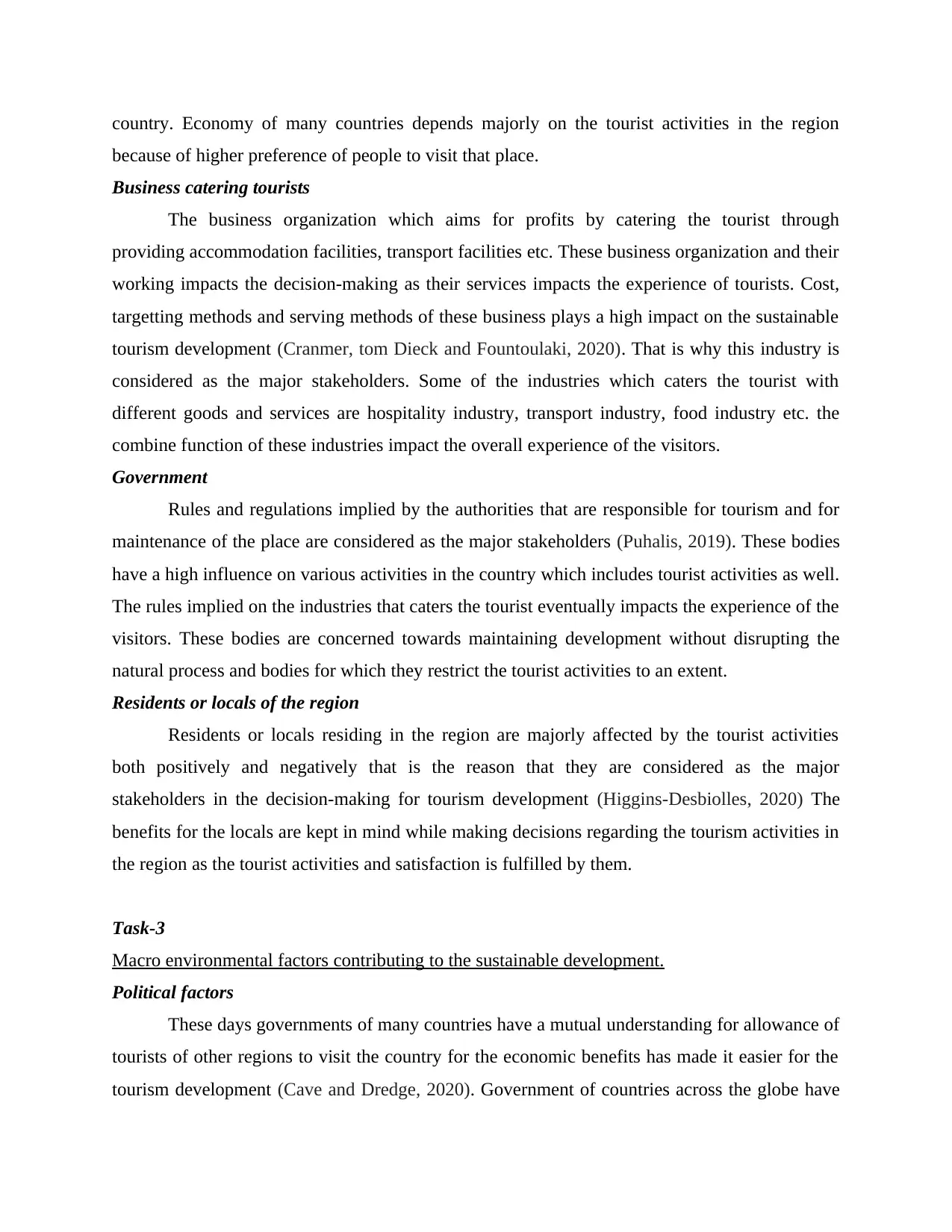
country. Economy of many countries depends majorly on the tourist activities in the region
because of higher preference of people to visit that place.
Business catering tourists
The business organization which aims for profits by catering the tourist through
providing accommodation facilities, transport facilities etc. These business organization and their
working impacts the decision-making as their services impacts the experience of tourists. Cost,
targetting methods and serving methods of these business plays a high impact on the sustainable
tourism development (Cranmer, tom Dieck and Fountoulaki, 2020). That is why this industry is
considered as the major stakeholders. Some of the industries which caters the tourist with
different goods and services are hospitality industry, transport industry, food industry etc. the
combine function of these industries impact the overall experience of the visitors.
Government
Rules and regulations implied by the authorities that are responsible for tourism and for
maintenance of the place are considered as the major stakeholders (Puhalis, 2019). These bodies
have a high influence on various activities in the country which includes tourist activities as well.
The rules implied on the industries that caters the tourist eventually impacts the experience of the
visitors. These bodies are concerned towards maintaining development without disrupting the
natural process and bodies for which they restrict the tourist activities to an extent.
Residents or locals of the region
Residents or locals residing in the region are majorly affected by the tourist activities
both positively and negatively that is the reason that they are considered as the major
stakeholders in the decision-making for tourism development (Higgins-Desbiolles, 2020) The
benefits for the locals are kept in mind while making decisions regarding the tourism activities in
the region as the tourist activities and satisfaction is fulfilled by them.
Task-3
Macro environmental factors contributing to the sustainable development.
Political factors
These days governments of many countries have a mutual understanding for allowance of
tourists of other regions to visit the country for the economic benefits has made it easier for the
tourism development (Cave and Dredge, 2020). Government of countries across the globe have
because of higher preference of people to visit that place.
Business catering tourists
The business organization which aims for profits by catering the tourist through
providing accommodation facilities, transport facilities etc. These business organization and their
working impacts the decision-making as their services impacts the experience of tourists. Cost,
targetting methods and serving methods of these business plays a high impact on the sustainable
tourism development (Cranmer, tom Dieck and Fountoulaki, 2020). That is why this industry is
considered as the major stakeholders. Some of the industries which caters the tourist with
different goods and services are hospitality industry, transport industry, food industry etc. the
combine function of these industries impact the overall experience of the visitors.
Government
Rules and regulations implied by the authorities that are responsible for tourism and for
maintenance of the place are considered as the major stakeholders (Puhalis, 2019). These bodies
have a high influence on various activities in the country which includes tourist activities as well.
The rules implied on the industries that caters the tourist eventually impacts the experience of the
visitors. These bodies are concerned towards maintaining development without disrupting the
natural process and bodies for which they restrict the tourist activities to an extent.
Residents or locals of the region
Residents or locals residing in the region are majorly affected by the tourist activities
both positively and negatively that is the reason that they are considered as the major
stakeholders in the decision-making for tourism development (Higgins-Desbiolles, 2020) The
benefits for the locals are kept in mind while making decisions regarding the tourism activities in
the region as the tourist activities and satisfaction is fulfilled by them.
Task-3
Macro environmental factors contributing to the sustainable development.
Political factors
These days governments of many countries have a mutual understanding for allowance of
tourists of other regions to visit the country for the economic benefits has made it easier for the
tourism development (Cave and Dredge, 2020). Government of countries across the globe have
Paraphrase This Document
Need a fresh take? Get an instant paraphrase of this document with our AI Paraphraser
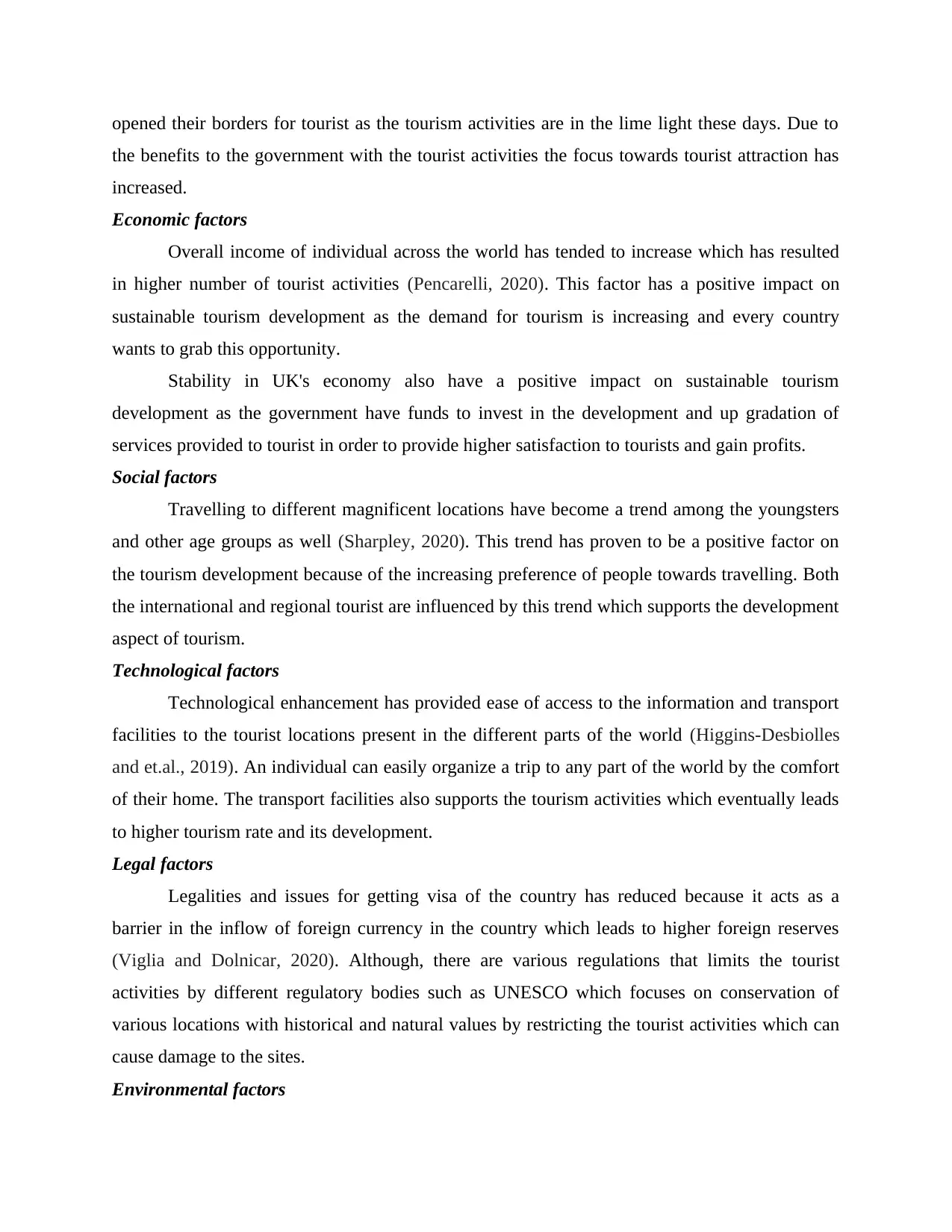
opened their borders for tourist as the tourism activities are in the lime light these days. Due to
the benefits to the government with the tourist activities the focus towards tourist attraction has
increased.
Economic factors
Overall income of individual across the world has tended to increase which has resulted
in higher number of tourist activities (Pencarelli, 2020). This factor has a positive impact on
sustainable tourism development as the demand for tourism is increasing and every country
wants to grab this opportunity.
Stability in UK's economy also have a positive impact on sustainable tourism
development as the government have funds to invest in the development and up gradation of
services provided to tourist in order to provide higher satisfaction to tourists and gain profits.
Social factors
Travelling to different magnificent locations have become a trend among the youngsters
and other age groups as well (Sharpley, 2020). This trend has proven to be a positive factor on
the tourism development because of the increasing preference of people towards travelling. Both
the international and regional tourist are influenced by this trend which supports the development
aspect of tourism.
Technological factors
Technological enhancement has provided ease of access to the information and transport
facilities to the tourist locations present in the different parts of the world (Higgins-Desbiolles
and et.al., 2019). An individual can easily organize a trip to any part of the world by the comfort
of their home. The transport facilities also supports the tourism activities which eventually leads
to higher tourism rate and its development.
Legal factors
Legalities and issues for getting visa of the country has reduced because it acts as a
barrier in the inflow of foreign currency in the country which leads to higher foreign reserves
(Viglia and Dolnicar, 2020). Although, there are various regulations that limits the tourist
activities by different regulatory bodies such as UNESCO which focuses on conservation of
various locations with historical and natural values by restricting the tourist activities which can
cause damage to the sites.
Environmental factors
the benefits to the government with the tourist activities the focus towards tourist attraction has
increased.
Economic factors
Overall income of individual across the world has tended to increase which has resulted
in higher number of tourist activities (Pencarelli, 2020). This factor has a positive impact on
sustainable tourism development as the demand for tourism is increasing and every country
wants to grab this opportunity.
Stability in UK's economy also have a positive impact on sustainable tourism
development as the government have funds to invest in the development and up gradation of
services provided to tourist in order to provide higher satisfaction to tourists and gain profits.
Social factors
Travelling to different magnificent locations have become a trend among the youngsters
and other age groups as well (Sharpley, 2020). This trend has proven to be a positive factor on
the tourism development because of the increasing preference of people towards travelling. Both
the international and regional tourist are influenced by this trend which supports the development
aspect of tourism.
Technological factors
Technological enhancement has provided ease of access to the information and transport
facilities to the tourist locations present in the different parts of the world (Higgins-Desbiolles
and et.al., 2019). An individual can easily organize a trip to any part of the world by the comfort
of their home. The transport facilities also supports the tourism activities which eventually leads
to higher tourism rate and its development.
Legal factors
Legalities and issues for getting visa of the country has reduced because it acts as a
barrier in the inflow of foreign currency in the country which leads to higher foreign reserves
(Viglia and Dolnicar, 2020). Although, there are various regulations that limits the tourist
activities by different regulatory bodies such as UNESCO which focuses on conservation of
various locations with historical and natural values by restricting the tourist activities which can
cause damage to the sites.
Environmental factors
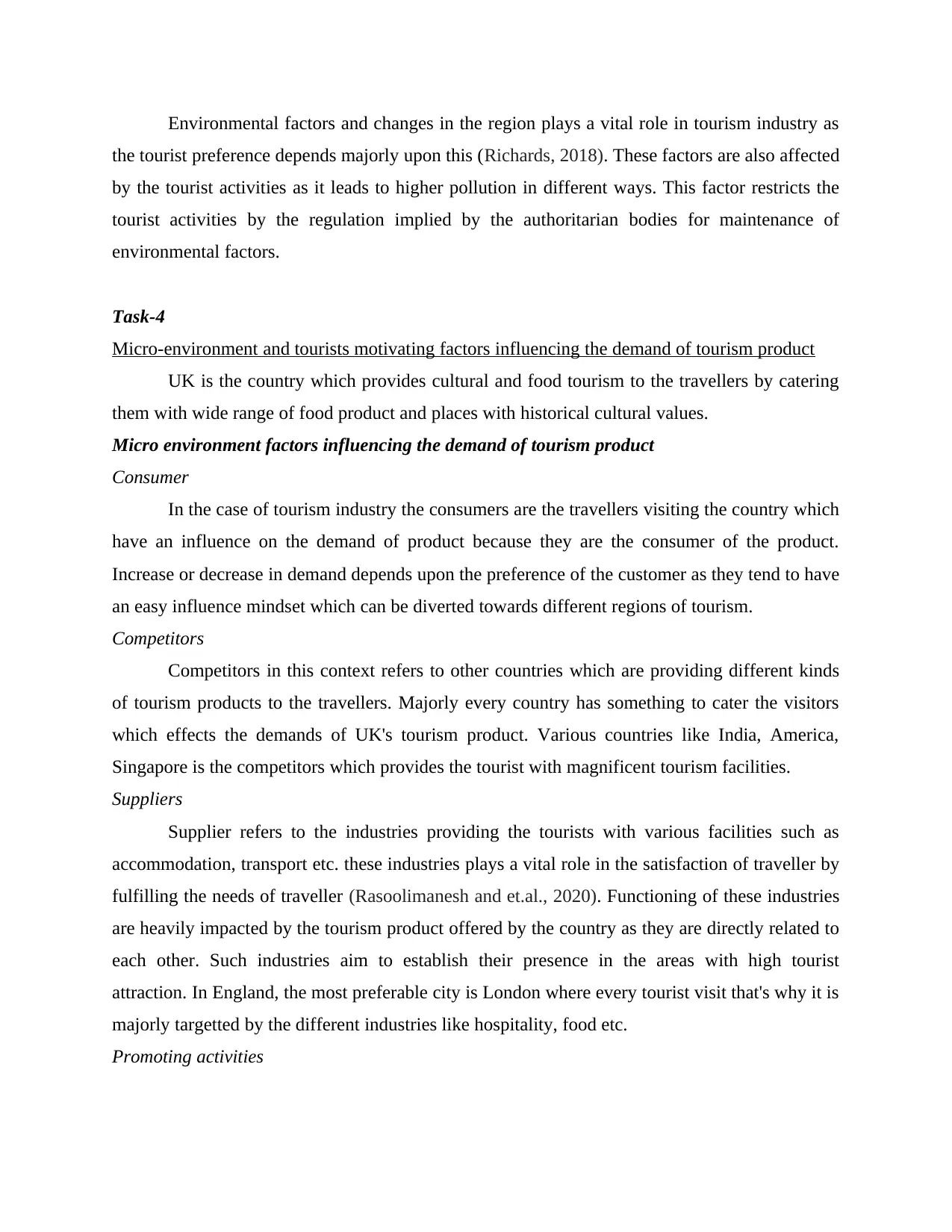
Environmental factors and changes in the region plays a vital role in tourism industry as
the tourist preference depends majorly upon this (Richards, 2018). These factors are also affected
by the tourist activities as it leads to higher pollution in different ways. This factor restricts the
tourist activities by the regulation implied by the authoritarian bodies for maintenance of
environmental factors.
Task-4
Micro-environment and tourists motivating factors influencing the demand of tourism product
UK is the country which provides cultural and food tourism to the travellers by catering
them with wide range of food product and places with historical cultural values.
Micro environment factors influencing the demand of tourism product
Consumer
In the case of tourism industry the consumers are the travellers visiting the country which
have an influence on the demand of product because they are the consumer of the product.
Increase or decrease in demand depends upon the preference of the customer as they tend to have
an easy influence mindset which can be diverted towards different regions of tourism.
Competitors
Competitors in this context refers to other countries which are providing different kinds
of tourism products to the travellers. Majorly every country has something to cater the visitors
which effects the demands of UK's tourism product. Various countries like India, America,
Singapore is the competitors which provides the tourist with magnificent tourism facilities.
Suppliers
Supplier refers to the industries providing the tourists with various facilities such as
accommodation, transport etc. these industries plays a vital role in the satisfaction of traveller by
fulfilling the needs of traveller (Rasoolimanesh and et.al., 2020). Functioning of these industries
are heavily impacted by the tourism product offered by the country as they are directly related to
each other. Such industries aim to establish their presence in the areas with high tourist
attraction. In England, the most preferable city is London where every tourist visit that's why it is
majorly targetted by the different industries like hospitality, food etc.
Promoting activities
the tourist preference depends majorly upon this (Richards, 2018). These factors are also affected
by the tourist activities as it leads to higher pollution in different ways. This factor restricts the
tourist activities by the regulation implied by the authoritarian bodies for maintenance of
environmental factors.
Task-4
Micro-environment and tourists motivating factors influencing the demand of tourism product
UK is the country which provides cultural and food tourism to the travellers by catering
them with wide range of food product and places with historical cultural values.
Micro environment factors influencing the demand of tourism product
Consumer
In the case of tourism industry the consumers are the travellers visiting the country which
have an influence on the demand of product because they are the consumer of the product.
Increase or decrease in demand depends upon the preference of the customer as they tend to have
an easy influence mindset which can be diverted towards different regions of tourism.
Competitors
Competitors in this context refers to other countries which are providing different kinds
of tourism products to the travellers. Majorly every country has something to cater the visitors
which effects the demands of UK's tourism product. Various countries like India, America,
Singapore is the competitors which provides the tourist with magnificent tourism facilities.
Suppliers
Supplier refers to the industries providing the tourists with various facilities such as
accommodation, transport etc. these industries plays a vital role in the satisfaction of traveller by
fulfilling the needs of traveller (Rasoolimanesh and et.al., 2020). Functioning of these industries
are heavily impacted by the tourism product offered by the country as they are directly related to
each other. Such industries aim to establish their presence in the areas with high tourist
attraction. In England, the most preferable city is London where every tourist visit that's why it is
majorly targetted by the different industries like hospitality, food etc.
Promoting activities
⊘ This is a preview!⊘
Do you want full access?
Subscribe today to unlock all pages.

Trusted by 1+ million students worldwide
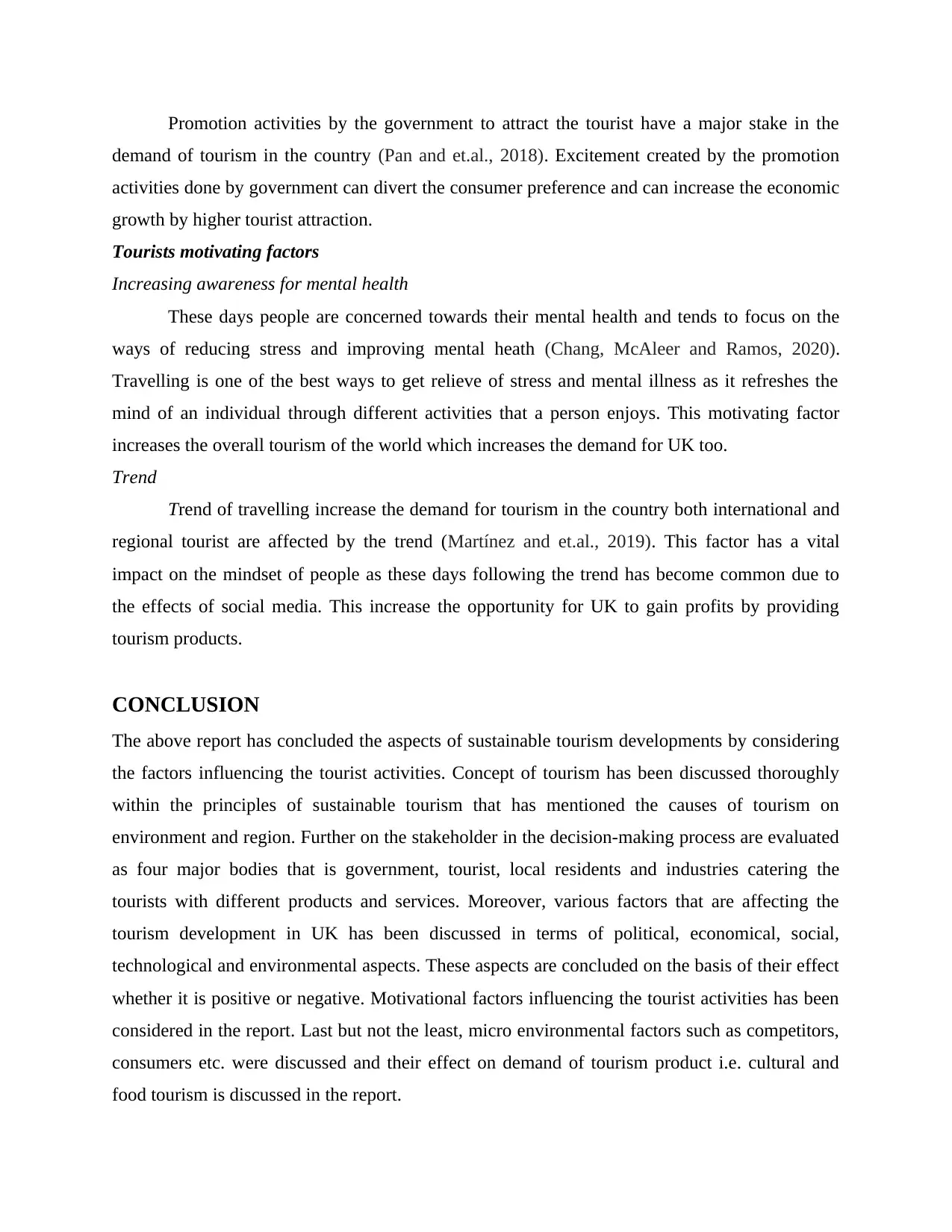
Promotion activities by the government to attract the tourist have a major stake in the
demand of tourism in the country (Pan and et.al., 2018). Excitement created by the promotion
activities done by government can divert the consumer preference and can increase the economic
growth by higher tourist attraction.
Tourists motivating factors
Increasing awareness for mental health
These days people are concerned towards their mental health and tends to focus on the
ways of reducing stress and improving mental heath (Chang, McAleer and Ramos, 2020).
Travelling is one of the best ways to get relieve of stress and mental illness as it refreshes the
mind of an individual through different activities that a person enjoys. This motivating factor
increases the overall tourism of the world which increases the demand for UK too.
Trend
Trend of travelling increase the demand for tourism in the country both international and
regional tourist are affected by the trend (Martínez and et.al., 2019). This factor has a vital
impact on the mindset of people as these days following the trend has become common due to
the effects of social media. This increase the opportunity for UK to gain profits by providing
tourism products.
CONCLUSION
The above report has concluded the aspects of sustainable tourism developments by considering
the factors influencing the tourist activities. Concept of tourism has been discussed thoroughly
within the principles of sustainable tourism that has mentioned the causes of tourism on
environment and region. Further on the stakeholder in the decision-making process are evaluated
as four major bodies that is government, tourist, local residents and industries catering the
tourists with different products and services. Moreover, various factors that are affecting the
tourism development in UK has been discussed in terms of political, economical, social,
technological and environmental aspects. These aspects are concluded on the basis of their effect
whether it is positive or negative. Motivational factors influencing the tourist activities has been
considered in the report. Last but not the least, micro environmental factors such as competitors,
consumers etc. were discussed and their effect on demand of tourism product i.e. cultural and
food tourism is discussed in the report.
demand of tourism in the country (Pan and et.al., 2018). Excitement created by the promotion
activities done by government can divert the consumer preference and can increase the economic
growth by higher tourist attraction.
Tourists motivating factors
Increasing awareness for mental health
These days people are concerned towards their mental health and tends to focus on the
ways of reducing stress and improving mental heath (Chang, McAleer and Ramos, 2020).
Travelling is one of the best ways to get relieve of stress and mental illness as it refreshes the
mind of an individual through different activities that a person enjoys. This motivating factor
increases the overall tourism of the world which increases the demand for UK too.
Trend
Trend of travelling increase the demand for tourism in the country both international and
regional tourist are affected by the trend (Martínez and et.al., 2019). This factor has a vital
impact on the mindset of people as these days following the trend has become common due to
the effects of social media. This increase the opportunity for UK to gain profits by providing
tourism products.
CONCLUSION
The above report has concluded the aspects of sustainable tourism developments by considering
the factors influencing the tourist activities. Concept of tourism has been discussed thoroughly
within the principles of sustainable tourism that has mentioned the causes of tourism on
environment and region. Further on the stakeholder in the decision-making process are evaluated
as four major bodies that is government, tourist, local residents and industries catering the
tourists with different products and services. Moreover, various factors that are affecting the
tourism development in UK has been discussed in terms of political, economical, social,
technological and environmental aspects. These aspects are concluded on the basis of their effect
whether it is positive or negative. Motivational factors influencing the tourist activities has been
considered in the report. Last but not the least, micro environmental factors such as competitors,
consumers etc. were discussed and their effect on demand of tourism product i.e. cultural and
food tourism is discussed in the report.
Paraphrase This Document
Need a fresh take? Get an instant paraphrase of this document with our AI Paraphraser
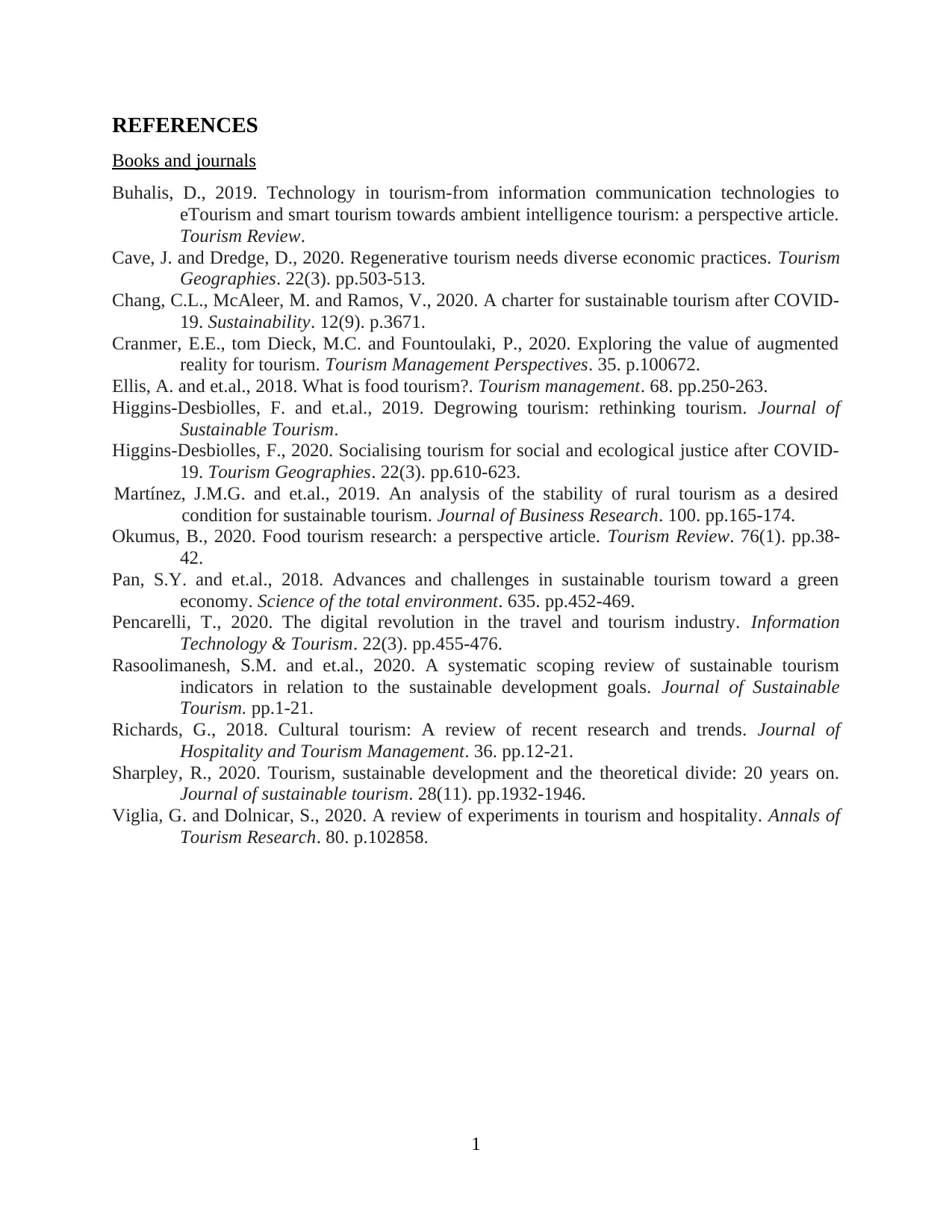
REFERENCES
Books and journals
Buhalis, D., 2019. Technology in tourism-from information communication technologies to
eTourism and smart tourism towards ambient intelligence tourism: a perspective article.
Tourism Review.
Cave, J. and Dredge, D., 2020. Regenerative tourism needs diverse economic practices. Tourism
Geographies. 22(3). pp.503-513.
Chang, C.L., McAleer, M. and Ramos, V., 2020. A charter for sustainable tourism after COVID-
19. Sustainability. 12(9). p.3671.
Cranmer, E.E., tom Dieck, M.C. and Fountoulaki, P., 2020. Exploring the value of augmented
reality for tourism. Tourism Management Perspectives. 35. p.100672.
Ellis, A. and et.al., 2018. What is food tourism?. Tourism management. 68. pp.250-263.
Higgins-Desbiolles, F. and et.al., 2019. Degrowing tourism: rethinking tourism. Journal of
Sustainable Tourism.
Higgins-Desbiolles, F., 2020. Socialising tourism for social and ecological justice after COVID-
19. Tourism Geographies. 22(3). pp.610-623.
Martínez, J.M.G. and et.al., 2019. An analysis of the stability of rural tourism as a desired
condition for sustainable tourism. Journal of Business Research. 100. pp.165-174.
Okumus, B., 2020. Food tourism research: a perspective article. Tourism Review. 76(1). pp.38-
42.
Pan, S.Y. and et.al., 2018. Advances and challenges in sustainable tourism toward a green
economy. Science of the total environment. 635. pp.452-469.
Pencarelli, T., 2020. The digital revolution in the travel and tourism industry. Information
Technology & Tourism. 22(3). pp.455-476.
Rasoolimanesh, S.M. and et.al., 2020. A systematic scoping review of sustainable tourism
indicators in relation to the sustainable development goals. Journal of Sustainable
Tourism. pp.1-21.
Richards, G., 2018. Cultural tourism: A review of recent research and trends. Journal of
Hospitality and Tourism Management. 36. pp.12-21.
Sharpley, R., 2020. Tourism, sustainable development and the theoretical divide: 20 years on.
Journal of sustainable tourism. 28(11). pp.1932-1946.
Viglia, G. and Dolnicar, S., 2020. A review of experiments in tourism and hospitality. Annals of
Tourism Research. 80. p.102858.
1
Books and journals
Buhalis, D., 2019. Technology in tourism-from information communication technologies to
eTourism and smart tourism towards ambient intelligence tourism: a perspective article.
Tourism Review.
Cave, J. and Dredge, D., 2020. Regenerative tourism needs diverse economic practices. Tourism
Geographies. 22(3). pp.503-513.
Chang, C.L., McAleer, M. and Ramos, V., 2020. A charter for sustainable tourism after COVID-
19. Sustainability. 12(9). p.3671.
Cranmer, E.E., tom Dieck, M.C. and Fountoulaki, P., 2020. Exploring the value of augmented
reality for tourism. Tourism Management Perspectives. 35. p.100672.
Ellis, A. and et.al., 2018. What is food tourism?. Tourism management. 68. pp.250-263.
Higgins-Desbiolles, F. and et.al., 2019. Degrowing tourism: rethinking tourism. Journal of
Sustainable Tourism.
Higgins-Desbiolles, F., 2020. Socialising tourism for social and ecological justice after COVID-
19. Tourism Geographies. 22(3). pp.610-623.
Martínez, J.M.G. and et.al., 2019. An analysis of the stability of rural tourism as a desired
condition for sustainable tourism. Journal of Business Research. 100. pp.165-174.
Okumus, B., 2020. Food tourism research: a perspective article. Tourism Review. 76(1). pp.38-
42.
Pan, S.Y. and et.al., 2018. Advances and challenges in sustainable tourism toward a green
economy. Science of the total environment. 635. pp.452-469.
Pencarelli, T., 2020. The digital revolution in the travel and tourism industry. Information
Technology & Tourism. 22(3). pp.455-476.
Rasoolimanesh, S.M. and et.al., 2020. A systematic scoping review of sustainable tourism
indicators in relation to the sustainable development goals. Journal of Sustainable
Tourism. pp.1-21.
Richards, G., 2018. Cultural tourism: A review of recent research and trends. Journal of
Hospitality and Tourism Management. 36. pp.12-21.
Sharpley, R., 2020. Tourism, sustainable development and the theoretical divide: 20 years on.
Journal of sustainable tourism. 28(11). pp.1932-1946.
Viglia, G. and Dolnicar, S., 2020. A review of experiments in tourism and hospitality. Annals of
Tourism Research. 80. p.102858.
1
1 out of 8
Related Documents
Your All-in-One AI-Powered Toolkit for Academic Success.
+13062052269
info@desklib.com
Available 24*7 on WhatsApp / Email
![[object Object]](/_next/static/media/star-bottom.7253800d.svg)
Unlock your academic potential
Copyright © 2020–2026 A2Z Services. All Rights Reserved. Developed and managed by ZUCOL.


